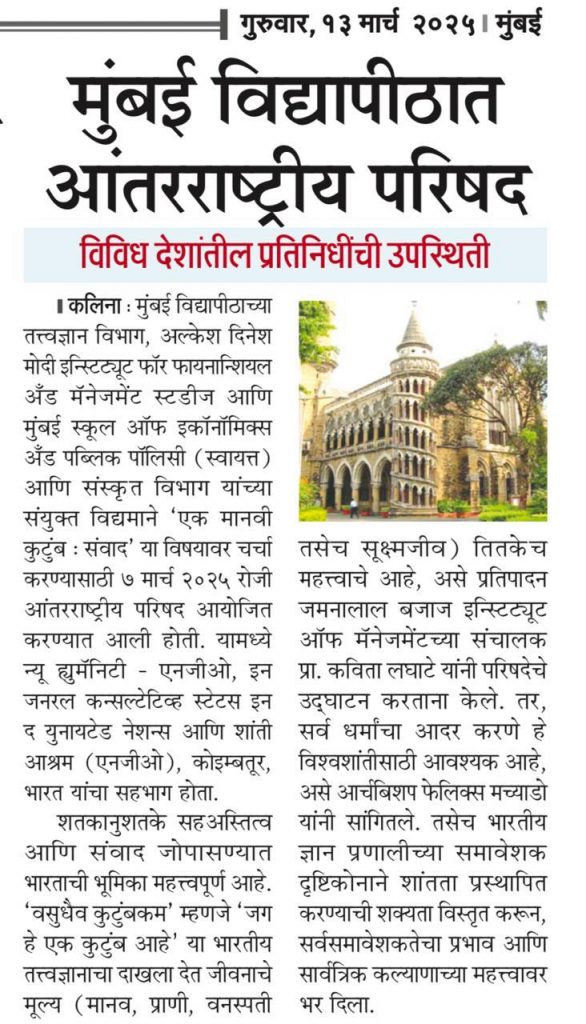
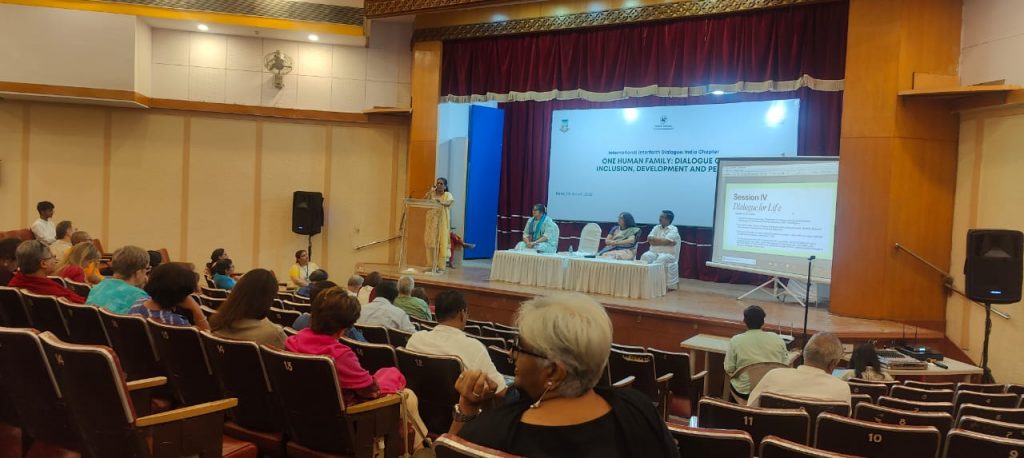
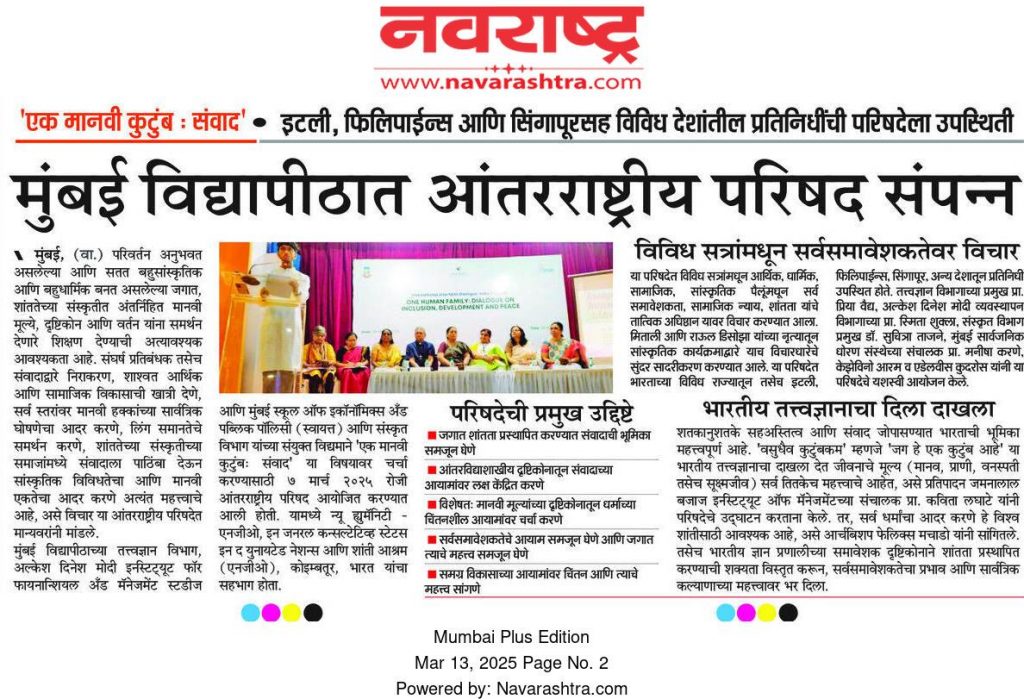
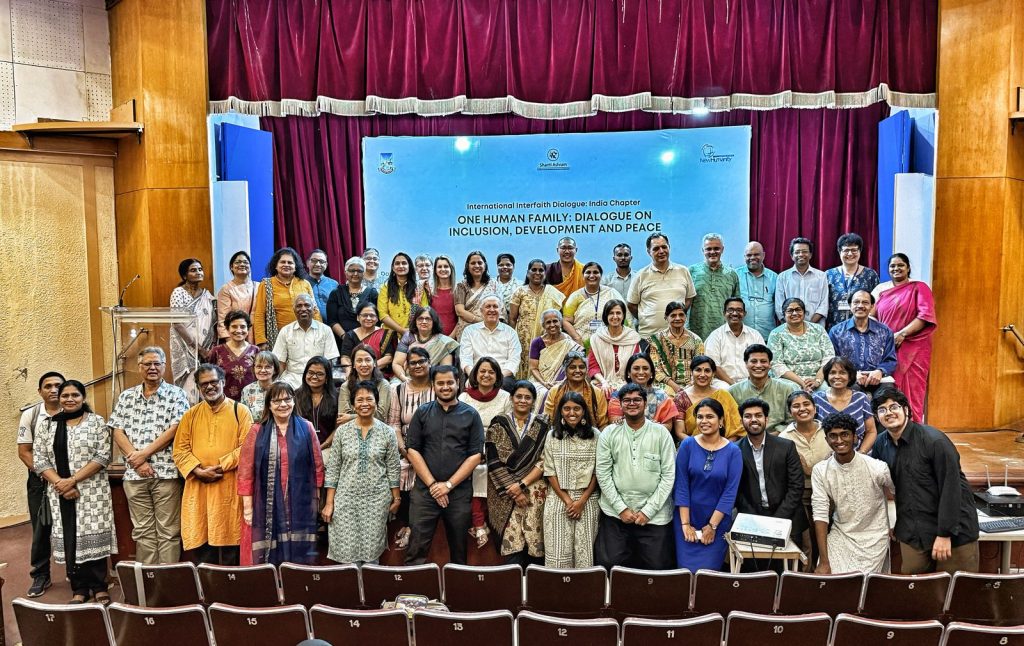
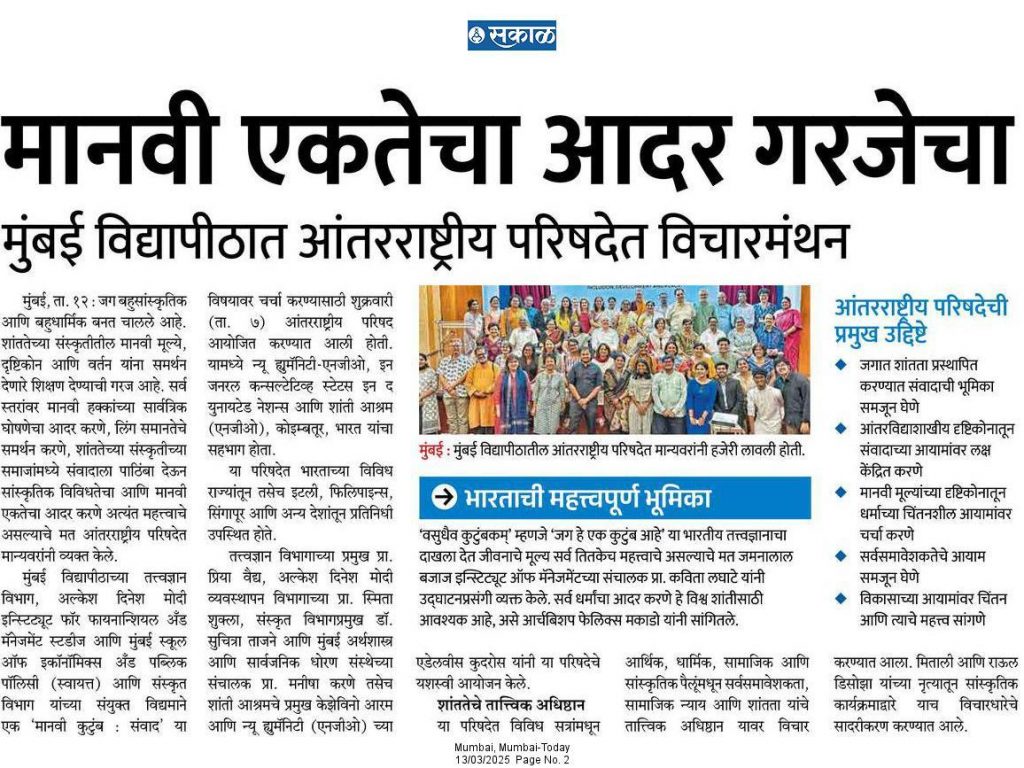
“Dialogue has to break through the social media and enter our lives.”
This was said by our Head of the Department Dr.SuchitraTajane while moderating a session at the International Conference – One Human Family Dialogue. This conference was held on the 7th of March 2025 at the University of Mumbai and it was jointly hosted by the Department of Philosophy, Mumbai school of economics and public policy, Alkesh Dinesh Mody institute for financial and management studies, Shanti Ashram, New Humanity NGO and Department of Sanskrit. It revolved around the theme of International interfaith dialogue.
The session started with ‘Shree Vishnu Stuti’ sung by Dr. Medha Deshpande. The conference began with the talk by Dr. Kala Acharya who pointed out that bilateral dialogue should be multi-religious. She also said that each one feels that their religion is unquestionable, but philosophical dialogue gives vision for coexistence. Dr. Acharya not just emphasized on the need for multi-religious dialogue but also mentioned that such a dialogue can move faster if one finds similarities in different religions especially the mystic elements. She went on to illustrate the examples of Krishna and Christ as well as Mother Goddess Parvati and Mother Mary. She concluded her talk with an urge to decontextualize dharma and emphasized that walking on the path is as important as reaching the goal.
Once the tone was set by Dr. Kala Acharya, Archbishop Felix Machado, Chairman, FABC-OEIA encouraged questions from the audience and soon the first session began. The theme of this session was Philosophy of Dialogue which was moderated by Dr.SuchitraNaik, Principal, head, Joshi BedekarCollege nominated associate Dean Humanities. Dr.Naik reminded everyone of Swami Vivekananda as she addressed the audience as My dear brothers and sisters of India. She spoke of different types of dialogues and one of them being silence. Dr.HarshaBadkar (Principal, Navneet Education Society’s Navneet College of Arts, Commerce and Science & Retired Associate Professor, Head, Department of Philosophy, Vice Principal, Wilson College) spoke on Dialogue in Hinduism. She elaborated on the ancient Indian Vaada tradition. Dr.Badkar illustrated several examples from the Upanishads about debates and dialogues between scholars as well as dialogues between a teacher and his students. She concluded that such dialogues led to intellectual refinement and in the process of attacking the adversaries in the debate, the debater gets enriched and this may lead to mutual respect. Dr.ZeenatShaukat Ali (Director General, Wisdom Foundation) discussed Dialogue in Islam. Dr. Ali said that if you have no sympathy for human pain you can’t retain the name of human and that human dignity is non-negotiable. She stressed on humanityas the common factor and how mantras like the Gayatri have similar meaning to prayers in Islam. Dialogue in Buddhism was dealt by Prof BhikkhuLobsangDorjeePaljor (Co-Founder, Sera JeyIgnou, Special Study Center, Bylakuppe) He stated that one human family is a fundamental reality we have to recognise it. Bhikku further explained how each one has been our mother is some lifetime and so the 3 R’s are important, namely recognise every one as your mother, remember her kindness and repay her kindness. He concluded saying that the concept of one truth-one religion is flawed and it should rather be several truths-several religions in multifaceted places and that people are created to be loved and things are created to be used and not otherwise. Dr. SM Michael (Emeritus Professor of Cultural Anthropology, Department of Sociology, University of Mumbai) spoke on Dialogue in Christianity. Dr. Michael discussion revolved on the Book marriage between the east and west. He raised the need of a blend between emotionality and rationality and individuality to collective mentality. Dr.Micheal concluded that inclusion is the basic principle; all other disparities can be bridged and emphasized to listen to each other’s silence with sensitivity and responding with wisdom.
The next session was moderated by Prof.ManishaKarne – (Director, Mumbai School of Economics) and the theme was Economy for peace. She opened the session with Amartya Sen’s quote – Peace is not solely a matter of economics or politics but of dignity. Dr.SuriakanthiIyengar, Reader Professor Gandhi Gram Rural Institute spoke on Gandhian economy for peace. She elaborated on the economic principles laid down by M.K.Gandhi which revolved around inclusive economy and empowerment. Dr.Iyengar also stressed on making the society self-sufficient. Then Dr.Vibhuti Patel, Former Professor, Advanced Centre for Women Studies, TISS, Mumbai, spoke on Gender and peace. Dr. Patel dealt with a wide range of topics that affected women, she also mentioned several movements led by women as well. Dr. Patel concluded that the participation of women can ensure results and make a lasting change and emphasized that peace is a condition possible only with social justice. This session ended with an online talk by Prof.LuiginoBruni ( Professor in Political Economy, LUMSA University, Rome,Italy)
The session post lunch dealt with Diversity, Inclusion and Equity. It was moderated by Dr.Smita Shukla (Professor & Director, Alkesh Dinesh Mody Institute for Financial and Management Studies, University of Mumbai.) In this session, Dr.A.K.Merchant(General Secretary, Temple of Understanding India Foundation) spoke about four kinds of people of which the last category are the ones who are the change makers. He further elaborated on how lesser identities can be sacrificed for higher ones as true reality is spiritual and how dialogue facilitates willingness to work together among the one human fellowship. Then DivyaMhatre from the Teach, and institution from hearing impaired passionately spoke about their work. This institute is not just teaching the hearing impaired but they have also partnered with several organizations for the placements of their students. Ms. Mhatre concluded by saying, inclusion is not charity but empowerment. Lawrence Chong (CEO of Consulus, Singapore) discussed inclusion in design through online mode. He made an elaborate presentation about his company and their work and how economic growth can be achieved thru one human family.
The final session under the theme dialogue for life was moderated by Dr.SuchitraTajane, (Associate Professor and Head, Department of Sanskrit, University of Mumbai.) She opened the session by stressing the need of dialogue in our lives when all are engrossed in dialogues through the social media. Prof.MeenalKatarnikar (Professor, Department of Philosophy,University of Mumbai) spoke on Engaging in dialogue for life, AnamPrem and New Humanity. Dr.Katarnikar elaborated on how in a dialogue bridges and built to come to some kind of an opinion without melting our own opinions. Acceptance of real difference and readiness to participate are the basic needs of any dialogue and such dialogues should not be restricted to a dais but should be practices in real life. The 6 golden rules were mentioned and she concluded by saying to be religious to be inter religious. Then Dr.MadhaviNaralay (Deputy Director, Centre for Hindu Studies & Associate Professor, Department of Sanskrit, University of Mumbai) began with how Indian tradition perceives dialogue. How we connect, learn, solve problems and contribute to the society through dialogues. This begins from the foetus in the form of garbhasanskar which has proven that talking to the baby in the womb, the energy and intentions are absorbed by the foetus. Abhimanyu heard a dialogue between his parents which enabled him to enter the chakravyuha and further went on the discuss dialogues across the Sanskrit texts right from the veda to the puranas, panchatantra and cave paintings. She spoke about the 4 types of dialogues and won the hearts of the audience by mentioning that social media exists due to dialogue.Dr.L.Raja (Former Head , Department of Lifelong Learning, Gandhi Gram University) presented their work which revolved around love, care and compassion. He emphasized on the 4 learnings to know, to understand, to do and to live together and concluded by saying that dialogue is for life, through life and throughout life.The session was concluded by a poem composed by Dr.Tajane on the theme of the conference.
Prof.Dr.Priya Vaidya (Head, Department of Philosophy, University of Mumbai) chaired the Valedictory ceremony. Dr.Kezevinu Aram (President, Shanti Ashram) addressed the audience. A cultural presentation on dialogue was performed by Raul D’Souza and MitaliD’Souza with an introduction by Ms. Edelweiss Quadros (Educational Consultant). Dr.Smita Shukla (Professor & Director, Alkesh Dinesh Mody Institute for Financial and Management Studies, University of Mumbai) gave vote of thanks. Program ended with the soulful recital of ‘Marathi Pasayadan’ of Sant Shree Dnyaneshvara Maharaj by Dr. Medha Deshpande.
-Report by Hema Kumar, Kanak Donde & Vijaya
